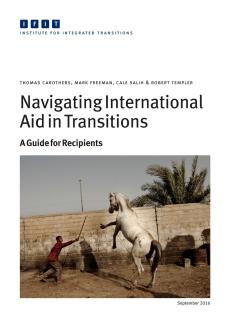International cooperation
Take agencies by their word

The job of the Institute for Integrated Transitions (IFIT) is to help countries move on from war or authoritarian rule to democracy. It has recently published a booklet with the title “Navigating international aid in transitions”. Overviews are available in English, Spanish, French and Arabic. IFIT is based in Barcelona and supported by the UNDP, various governments (including Germany’s) and private foundations.
The booklet argues that aid recipients are overwhelmed by the multitude of agencies that offer support after a civil war or after an authoritarian regime has ended. To make the most of aid, the recipients need to know who they are dealing with and what to expect of partners. Accordingly, the authors spell out how bilateral organisations differ from multilateral ones and how profit-making agencies differ from non-profits. It admits that the distinctions are not always clear cut, for instance, when a government agency is registered as a private-sector company which is owned by the state. The booklet also provides a short overview of what tools aid agencies use – from budget support to staff training.
The authors point out common misconceptions. Examples include:
- Western donors are naïve to expect innovative information technology to always serve democratisation. It can also serve disinformation.
- The young generation is not always a force for a more open society. Traumatised youngsters can just as well develop a longing for the kind of security that strongmen promise.
- Elections, moreover, do not always lead to more accountability. If relevant forces are suspected of manipulating the event, elections may trigger violence and exacerbate distrust.
The most important point, however, is that “all good things” do not always go together. In the 1990s, donor governments and aid agencies generally believed that market economies and democracies go hand in hand. An often ignored implication, as the IFIT warns, is that botched economic reforms will thwart the transition to democracy.
The IFIT publication is candid, and many aid agencies will probably disagree with some of its findings. They are likely to find one section particularly irritating. It deals with agencies reiterating “chronic resolutions for doing better”, but rarely fulfilling the related pledges of “breaking down silos”, “ensuring local ownership” or “increasing transparency”, for example.
The booklet explains accurately why agencies struggle to live up to such promises and invites aid recipients to take them at word. The authors probably underestimate the challenge. The key problem is not ignorance on the recipients’ side, but their recent experience of arbitrary rule and violence. It is likely to keep them from speaking up to paymasters about double standards.
It takes courage to speak truth to power. People who have just escaped civil war or authoritarian rule are neither used to the freedom of speech nor the rule of law. Moreover, they are fully aware of leaders’ beautiful rhetoric which often proved wrong by brutal behaviour. The mindset of aid-agency staff is different of course, fostered in democratic societies. But it matters that their partners are used to despotism.
The IFIT publication encourages aid recipients to deal with aid agencies in the same way that self-confident citizens of established democracies deal with state authorities. This is a valid goal, but it is not an attitude that is likely in the early phases of a transition from civil war or authoritarian rule. The booklet certainly deserves the attention of aid recipients, but aid agencies must take it to heart too. They face the serious and counter-intuitive dilemma of having to encourage partners to be hard on them.
Hans Dembowski
Link
Navigating international aid in transitions:
http://www.ifit-transitions.org/publications/navigating-international-aid-in-transitions-a-guide-for-recipients












